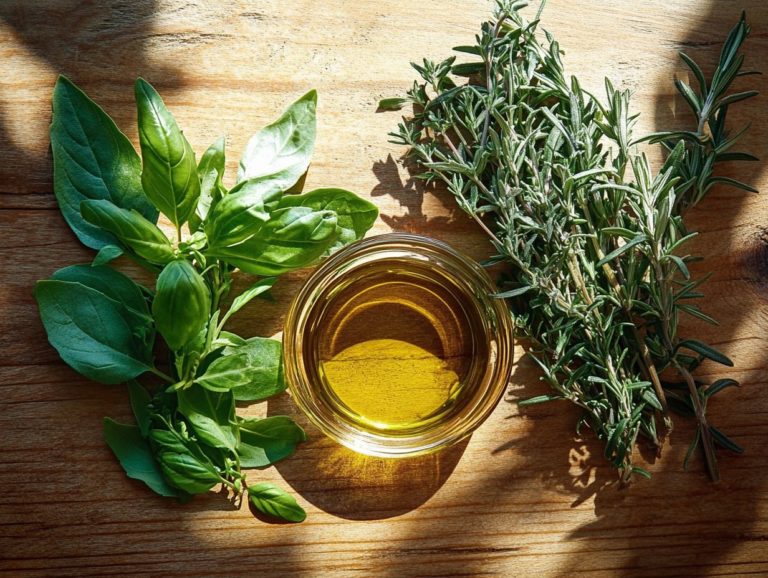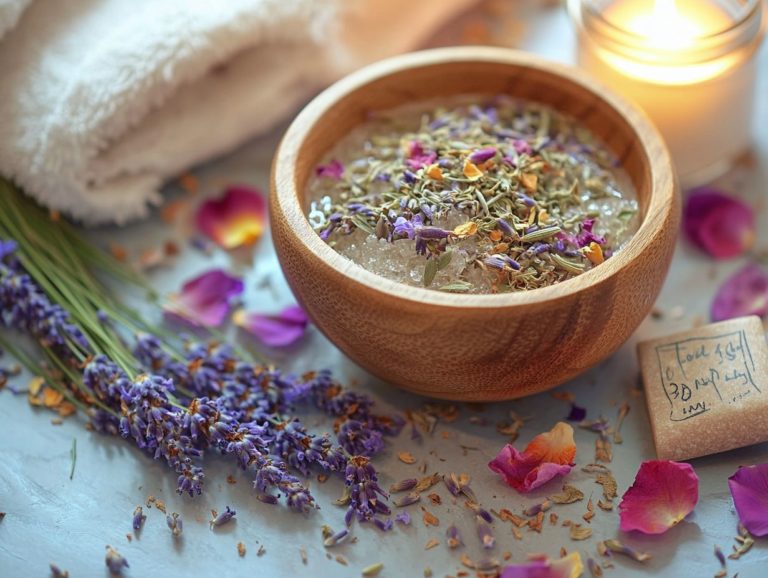5 Ways to Use Rosemary in Healing
Rosemary, a fragrant herb often linked to culinary wonders, boasts a rich history steeped in healing traditions.
From alleviating pain to promoting digestion and even enhancing hair growth, this versatile herb presents a plethora of medicinal benefits. You re about to explore five ways to harness rosemary s remarkable healing properties.
Discover how you can effortlessly weave rosemary into your daily routine, learn about its distinctive medicinal qualities, and uncover how to enjoy its soothing effects.
Dive in and unlock the secrets of this extraordinary herb!
Contents
Key Takeaways:
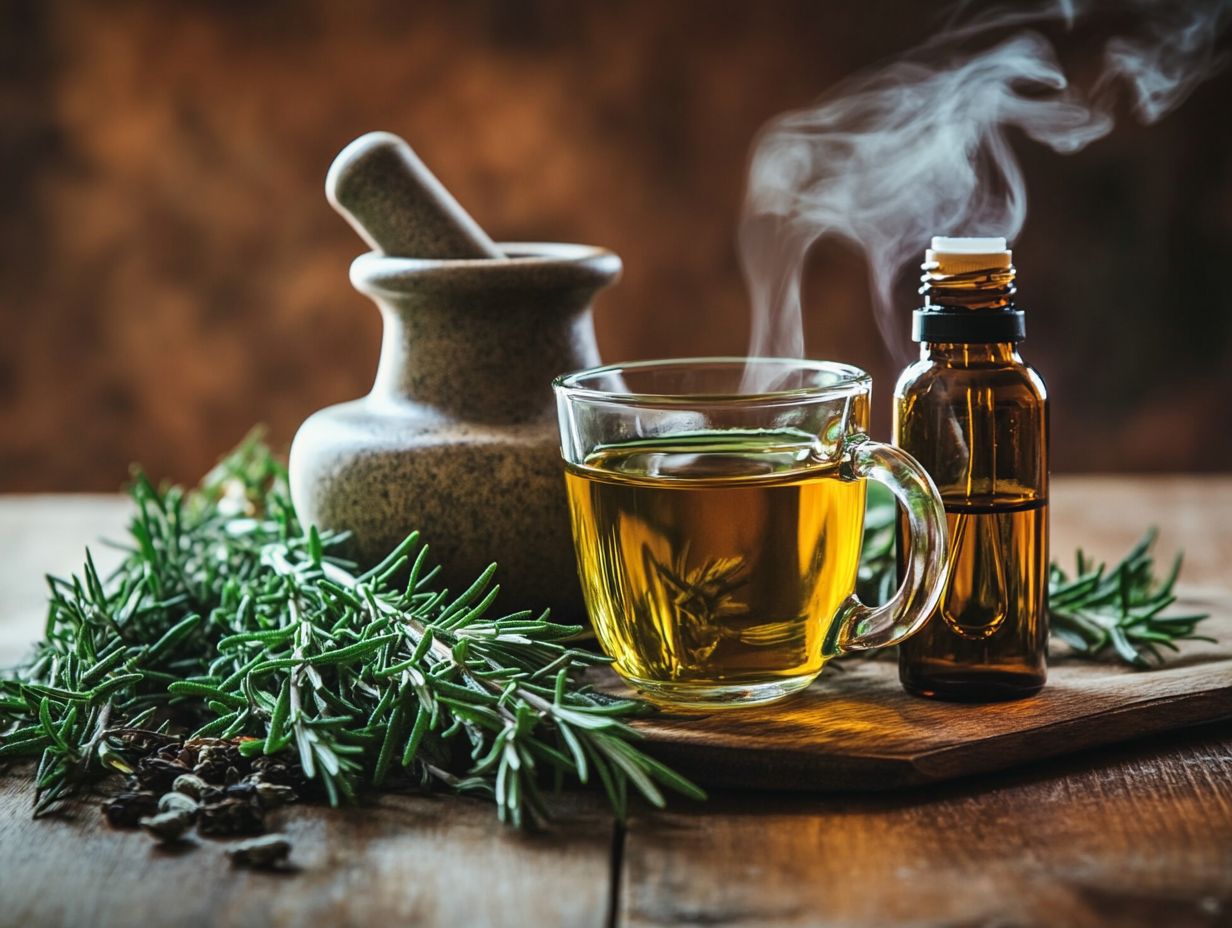
- Rosemary essential oil can provide pain relief when applied topically.
- Rosemary tea can aid in digestion and promote digestive health.
- Infusing rosemary into oil can promote hair growth and improve scalp health.
1. Rosemary Essential Oil for Pain Relief
Rosemary essential oil, sourced from the aromatic herb Rosmarinus officinalis, is renowned for its exceptional pain relief properties. This Mediterranean herb offers soothing effects for muscle discomfort and bolsters your immune system, making it a versatile option in herbal remedies.
The extraction process usually involves steam distillation, a method that captures essential volatile compounds while maintaining their beneficial qualities. Discover exciting ways to apply rosemary oil through topical massage or diffusion targeting specific areas of discomfort for enhanced relief.
Conditions such as arthritis, minor injuries, and tension headaches can greatly benefit from its application. Scientific studies suggest that the topical use of rosemary essential oil may improve circulation and decrease pain perception, delivering substantial benefits.
While it s generally safe, it s wise to be aware of potential side effects, such as skin irritation or allergic reactions, especially in individuals with sensitive skin.
2. Rosemary Tea for Digestive Health
Rosemary tea, crafted from the leaves of Rosmarinus officinalis, is celebrated for its remarkable digestive health benefits. With a rich array of antioxidants, this herbal infusion supports digestion and overall gut wellness. It provides a comforting experience for those grappling with indigestion.
Incorporating rosemary tea into your daily routine is both seamless and rewarding. To prepare this aromatic elixir, simply steep fresh or dried leaves in hot water for about five to ten minutes.
The essential compounds, particularly natural compounds found in rosemary, not only help alleviate digestive discomfort but also offer anti-inflammatory benefits that foster healthy gut flora. Whether you choose to enjoy it in the morning as a refreshing start or in the evening for a calming wind-down, this delightful tea serves as a natural remedy that promotes digestive harmony, making it a critical asset to your wellness regimen.
3. Rosemary Infused Oil for Hair Growth
Rosemary-infused oil is becoming quite the sensation as a natural remedy for promoting hair growth. By harnessing the powerful properties of rosemary oil, which is rich in essential oils and plant compounds, you can nourish your scalp and enhance blood circulation.
To create this elixir at home, steep fresh or dried rosemary leaves in a carrier oil think olive or coconut oil for several weeks. This allows all those beneficial nutrients to infuse beautifully. Many enthusiasts rave about this method for its cost-effectiveness and proven efficacy.
Scientific studies suggest that rosemary oil can stimulate hair follicles and combat hair loss, putting it on par with conventional treatments. When using your rosemary-infused oil, consider giving your scalp a gentle massage to boost blood flow even more.
For optimal results, blending it with essential oils like peppermint or lavender can enhance its benefits, transforming your hair care routine into a refreshing and revitalizing experience.
Start incorporating rosemary into your wellness routine and experience the difference it can make!
4. Rosemary Tincture for Respiratory Issues
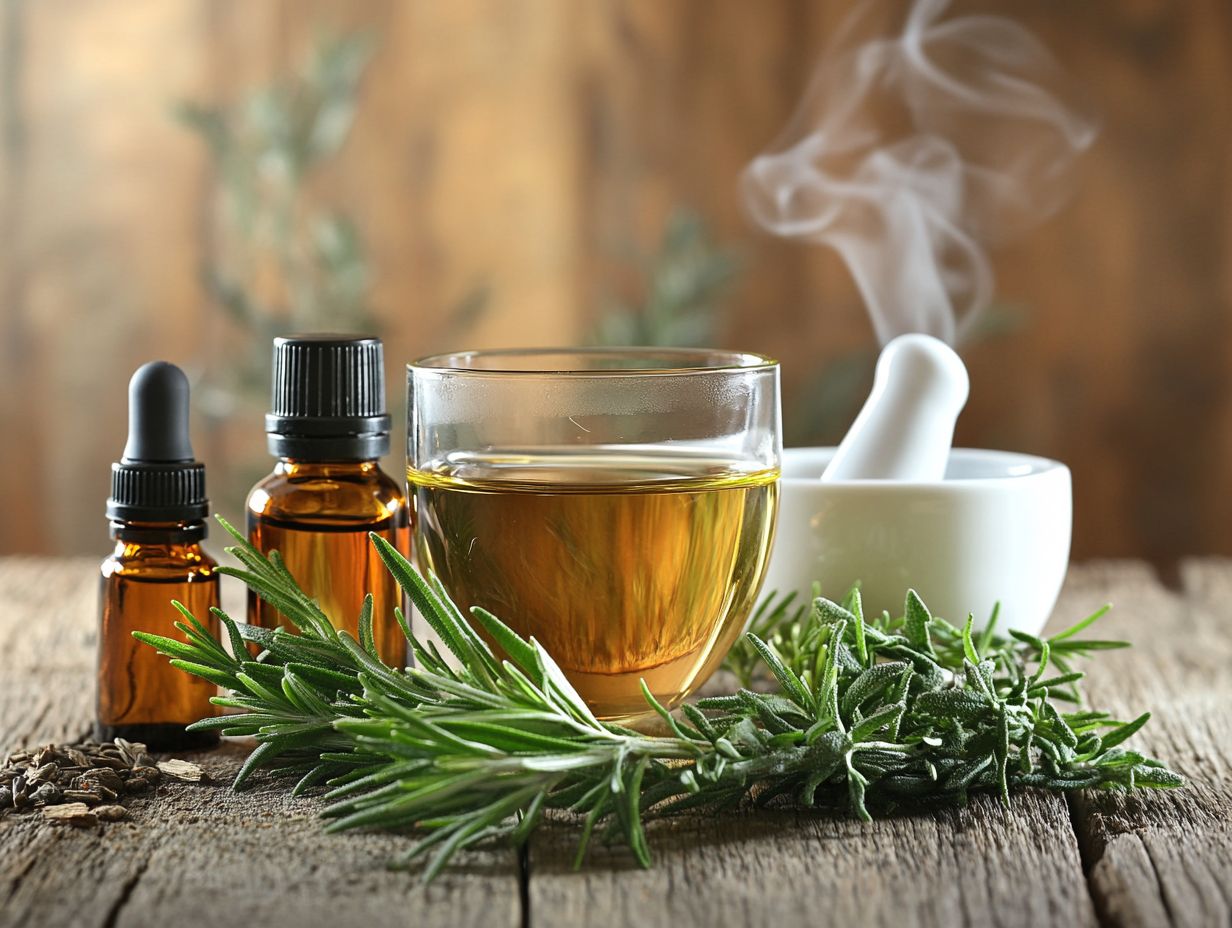
Rosemary tincture, a concentrated herbal extract sourced from Rosmarinus officinalis, stands as a strong support for your breathing health. It leverages the medicinal virtues of this aromatic herb to ease common respiratory concerns. Its key compounds, notably carnosic acid, play a significant role in its effectiveness within traditional medicine and herbal therapies.
To craft your own rosemary tincture, simply combine fresh or dried rosemary leaves with high-proof alcohol. Allow it to steep for several weeks in a dark, cool environment. This process extracts beneficial oils and compounds effectively, resulting in a potent solution.
If you find yourself facing respiratory challenges, incorporating this tincture could help promote clearer airways and alleviate inflammation. Thanks to the herb’s natural anti-inflammatory and antioxidant properties, studies show these compounds can fight stress in your lungs.
Integrating rosemary tincture into your herbal remedies is a breeze just add a few drops to warm herbal teas. This not only enhances the flavor but also elevates the health benefits, delivering a soothing effect that you ll appreciate.
5. Rosemary Bath for Relaxation and Stress Relief
A rosemary bath provides you with a serene escape, perfect for relaxation and stress relief. Infusing your bathwater with the calming essence of Rosmarinus officinalis, it s renowned for its ability to elevate mental well-being through using scents for relaxation. This practice brings out the soothing scents of rosemary, creating a tranquil atmosphere and making it a favored choice for those on a journey toward holistic wellness.
To craft this soothing bath, start by steeping fresh rosemary leaves in hot water for about ten minutes. This allows those delightful oils to release their calming fragrance. If fresh leaves aren t on hand, don t worry dried rosemary or a few drops of rosemary essential oil can serve as lovely alternatives.
As the warm water embraces your body, the scent of rosemary will not only soothe your mind but may also help lower stress levels by engaging your limbic system, which is part of the brain that controls emotions. The link between aroma and mental wellness makes rosemary great for meditation or unwinding after a hectic day.
For an even better experience, try diffusing rosemary essential oil nearby. This will help you craft an immersive aromatherapy environment that promotes deeper relaxation and mental clarity, elevating your bath to a truly rejuvenating ritual.
What Is Rosemary and Its History in Healing?
Rosemary, or Rosmarinus officinalis if you want to impress your friends at dinner parties, is a Mediterranean herb with a storied past in healing practices. It s not just a flavor enhancer for your favorite dishes; this herb has long been celebrated for its medicinal properties across various cultures. Traditionally, you might find rosemary in herbal remedies aimed at boosting the immune system, sharpening cognitive function, and promoting overall well-being, making it a staple in both culinary arts and ancient medicine.
Historically, this aromatic herb has symbolized remembrance and fidelity, often woven into cultural rituals and ceremonies. Think of the ancient Egyptians, who utilized it in embalming practices, or medieval Europeans, who believed it offered protection against illnesses. Rosemary’s applications have been both diverse and profound.
As scientific research marches forward, modern studies are starting to back up these age-old beliefs. Compounds in rosemary boast antioxidant and anti-inflammatory properties. This fascinating journey from folklore to contemporary health practices not only validates rosemary’s historical uses but also highlights its relevance in today s herbal medicine.
Try making your own rosemary tincture and feel the difference in your breathing!
What Are the Medicinal Properties of Rosemary?
Rosemary is truly a gem, celebrated for its impressive array of medicinal properties. Thanks to potent antioxidants like carnosic acid, it plays a significant role in promoting digestive health and alleviating muscle pain. This versatile herb not only elevates your culinary creations but also stands as a powerful ally in numerous herbal remedies.
Beyond its digestive perks, rosemary has garnered attention for its potential protective effects against chronic diseases, including Alzheimer’s and cancer. Research suggests that compounds found in rosemary might enhance memory and cognitive function, likely due to their benefits for brain health.
Rosemary has natural antibacterial and anti-inflammatory qualities that strengthen your immune system. This offers a shield against infections and reduces inflammation throughout the body. Historically, this remarkable herb has been embraced in traditional healing practices. It has often been used as an essential oil to relieve stress and sharpen mental clarity, showcasing its multifaceted role in both contemporary and ancient medicine.
How Can Rosemary Be Used in Aromatherapy?
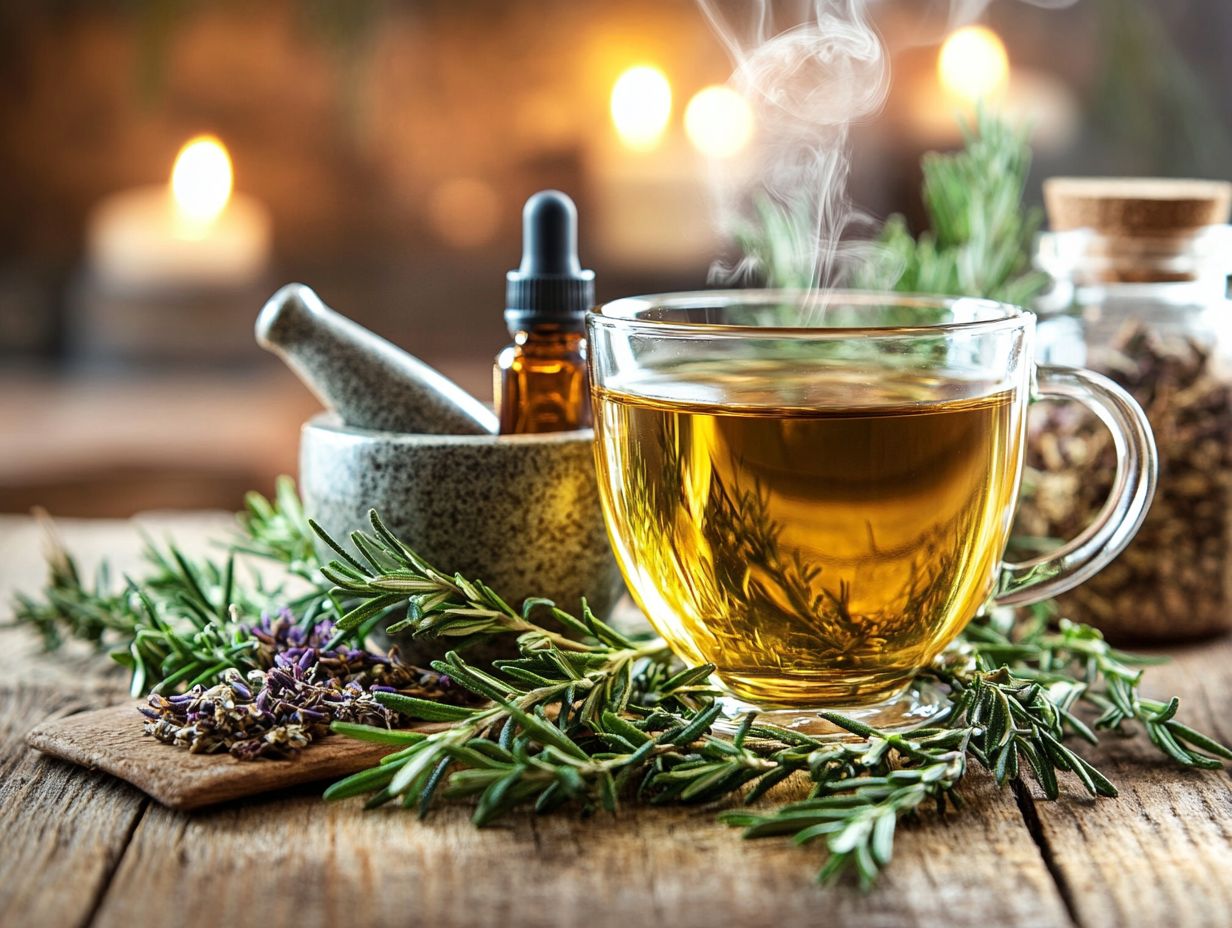
Rosemary can be a powerful ally in your aromatherapy journey. It serves as a natural mood enhancer with essential oils that promote mental clarity and relieve stress. Experience the amazing therapeutic benefits of this aromatic herb and elevate your overall mental well-being.
There are various methods to savor these benefits. Try diffusing rosemary essential oil in a burner. It will fill your space with its refreshing scent, creating an invigorating atmosphere. Alternatively, consider crafting personalized massage oils infused with rosemary. This not only enhances your physical relaxation but also uplifts your spirit during a soothing massage session.
You can further enrich your bath therapies by adding rosemary essential oil to warm water. This offers a calming escape that allows your mind to unwind and reset. Each of these methods boosts your mood while showcasing rosemary’s unique ability to enhance mental focus and alleviate anxiety.
What Are the Potential Side Effects of Using Rosemary for Healing?
While you may find rosemary to be a generally safe herb, it s essential to be aware of potential side effects that could arise from its use in herbal treatments and essential oils. By understanding these effects, you can ensure its safe incorporation into your health regimen.
Some individuals might experience allergic reactions, which could manifest as skin irritation, rashes, or even respiratory issues. It s especially important for pregnant women, those with epilepsy, or anyone on specific medications to exercise caution, as rosemary can have contraindications for these groups.
Stay safe! Always follow recommended dosages and dilution guidelines, particularly when it comes to essential oils. If you notice any unusual symptoms or feel uncertain about adding rosemary to your routine, consulting a healthcare provider is a wise move to avoid adverse effects and maintain your well-being.
How Can One Incorporate Rosemary into Their Daily Routine for Healing?
Incorporating rosemary into your daily routine can truly elevate your health and well-being. Whether you re using it in your cooking, brewing herbal tea, or enjoying it through essential oils, this versatile herb seamlessly integrates into various aspects of life.
Imagine elevating your meals by adding fresh or dried rosemary to roasted vegetables or marinades. It’s like giving your palate a delightful twist it didn t know it needed! When you steep it for a soothing herbal tea, rosemary not only offers potential digestive benefits but also has the power to uplift your mood.
Consider incorporating rosemary-infused oils into your skincare regimen. Unleash the power of rosemary! Its antioxidants can give your skin a vibrant, healthy glow. By weaving this aromatic herb into your wellness routines, you ll find it s not only simple but also deeply rewarding. Don t wait! Start incorporating rosemary into your meals and skincare today for incredible benefits!
What Are Some Other Traditional Uses of Rosemary in Healing?
Rosemary has been a staple in traditional healing practices for centuries. It enhances digestive health and supports cognitive function. This showcases its remarkable versatility as a medicinal herb. Its historical significance in holistic treatments highlights its value in both ancient and modern herbal medicine.
In Mediterranean cultures, rosemary is loved for its amazing benefits, not just for its culinary applications but also for its health benefits. Ancient Greeks often sported sprigs of rosemary during exams, convinced it would boost their memory and concentration. In the realm of traditional healing methods used in communities, this aromatic herb has been employed to alleviate headaches, ease muscle pain, and uplift emotional well-being with its soothing scents.
The use of rosemary in rituals and ceremonies across various cultures reflects its esteemed status as a symbol of remembrance and healing, seamlessly bridging the gap between tradition and contemporary wellness practices.
Frequently Asked Questions
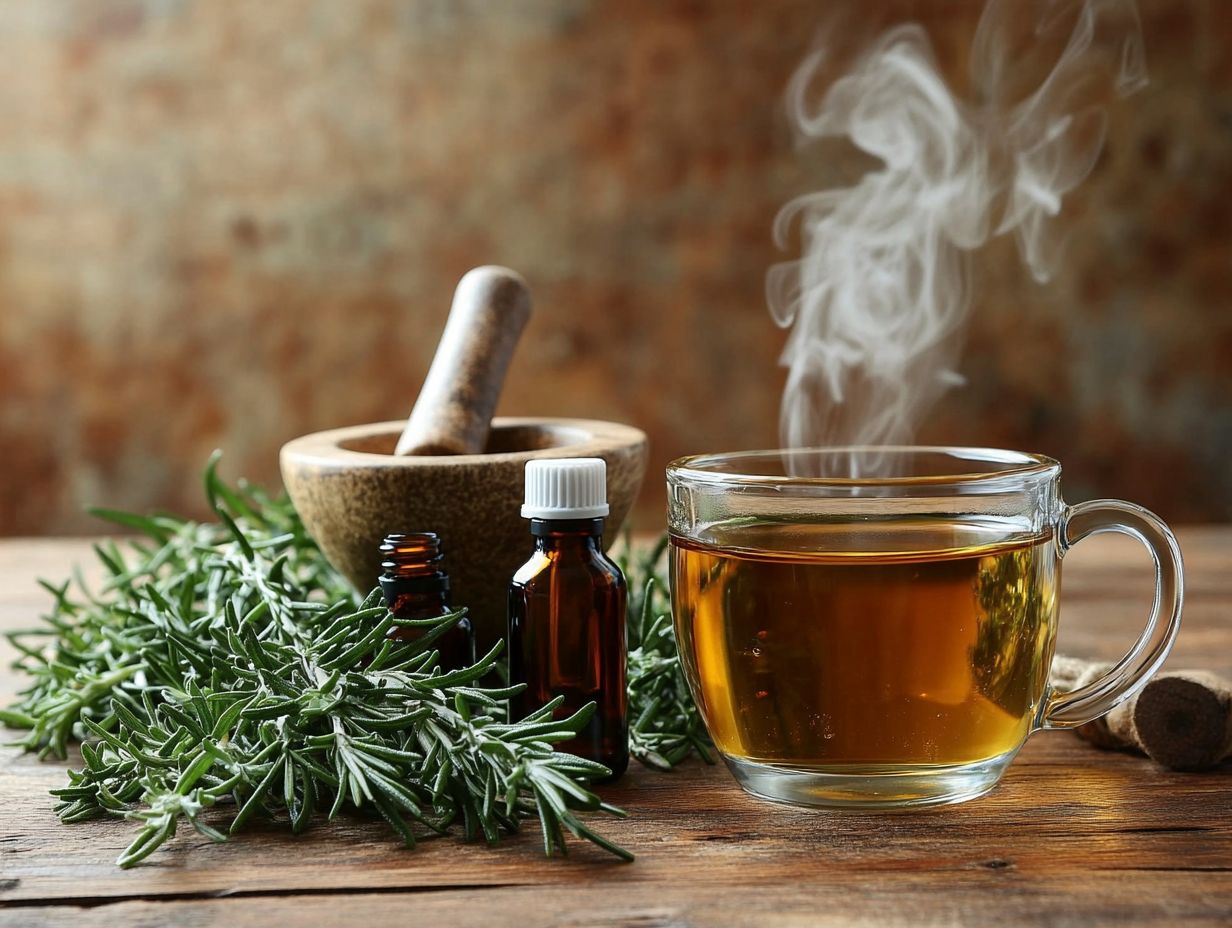
What are the 5 ways to use Rosemary in healing?
- Aromatherapy: Rosemary oil can boost memory and reduce stress.
- Topical Use: It helps relieve muscle pain and improve skin health.
- Herbal Tea: Rosemary tea aids digestion and boosts immunity.
- Massage Oil: A mix of rosemary essential oil with a carrier oil creates a calming massage oil.
- Culinary Uses: Adding rosemary to food enhances flavor and provides health benefits.
Is Rosemary safe to use for healing purposes?
Yes, when used properly, rosemary is generally safe for use in healing. However, pregnant women, those with high blood pressure, and those on certain medications should consult with a healthcare professional before using rosemary oil.
How can I make rosemary tea for healing?
To make rosemary tea, steep 1-2 teaspoons of dried rosemary leaves in a cup of hot water for 5-10 minutes. You can add honey or lemon for added flavor and health benefits.
What are the benefits of using rosemary in aromatherapy?
Rosemary essential oil has a refreshing and uplifting scent that can help improve memory and concentration, reduce stress and anxiety, and relieve headaches.
Can I use rosemary for skin and hair health?
Yes! Rosemary oil soothes skin irritations and promotes healthy hair growth when applied directly to the skin.
Are there any other ways to use rosemary in healing?
Yes! You can create a rosemary-infused steam bath for respiratory health, use it in a hair rinse for dandruff and scalp health, and consume it as a supplement for overall wellness.

